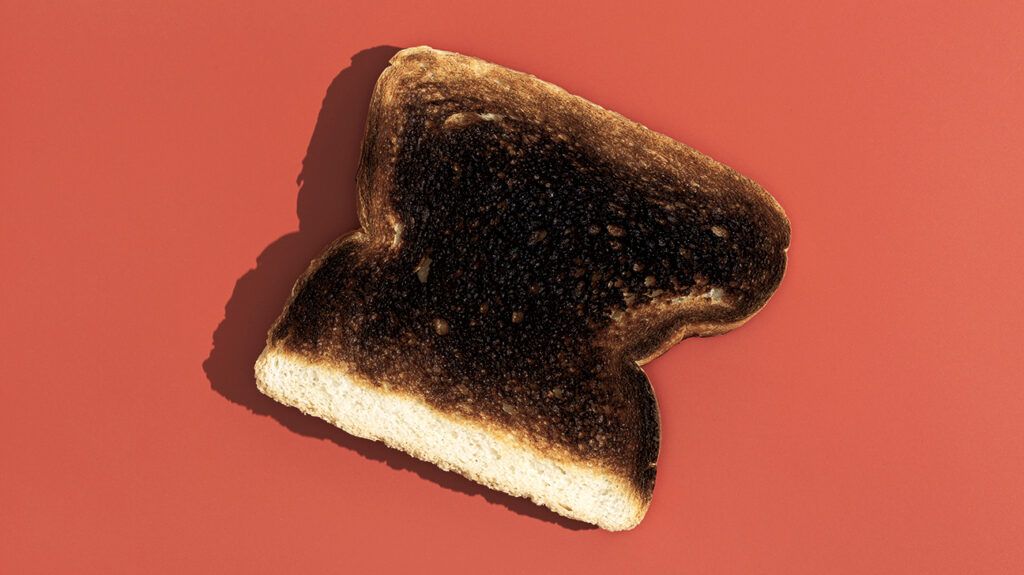Smelling burnt toast is not a typical sign of a heart attack. Smelling odors that are not there is called phantosmia. Although phantosmia may indicate an underlying cause, researchers do not typically associate the condition with heart attacks.
This article looks at whether smelling burnt toast may be a sign of a heart attack, whether the odor may indicate a stroke, and what else could cause a person to experience phantom smells.
It also looks at diagnosing and treating phantom smells and when to contact a doctor.

Smelling burnt toast is not a typical sign of a heart attack. However, phantosmia may occur in people with various cardiovascular health conditions.
For example, one
Additionally, a
Aside from insubstantial connections between cardiovascular health and phantosmia, research does not suggest that heart attacks may be a significant cause of smelling phantom odors such as burnt toast.
Is it a heart attack?
Heart attacks occur when there is a lack of blood supply to the heart. Symptoms include:
- chest pain, pressure, or tightness
- pain that may spread to arms, neck, jaw, or back
- nausea and vomiting
- sweaty or clammy skin
- heartburn or indigestion
- shortness of breath
- coughing or wheezing
- lightheadedness or dizziness
- anxiety that can feel similar to a panic attack
If someone has these symptoms:
- Dial 911 or the number of the nearest emergency department.
- Stay with them until the emergency services arrive.
If a person stops breathing before emergency services arrive, perform manual chest compressions:
- Lock fingers together and place the base of hands in the center of the chest.
- Position shoulders over hands and lock elbows.
- Press hard and fast, at a rate of 100–120 compressions per minute, to a depth of 2 inches.
- Continue these movements until the person starts to breathe or move.
- If needed, swap over with someone else without pausing compressions.
Use an automated external defibrillator (AED) available in many public places:
- An AED provides a shock that may restart the heart.
- Follow the instructions on the defibrillator or listen to the guided instructions.
There is no evidence to suggest that smelling burnt toast indicates a stroke, although people have reported it anecdotally.
However, a person should be aware of the warning signs of stroke and seek immediate treatment if they or someone else experiences symptoms. Stroke treatment is most effective within
A person may use the acronym “FAST” to
- F — face drooping: A person should ask the individual to smile to identify whether one side of the face appears uneven. They should ask if the face feels numb on the affected side.
- A — arm weakness: Arm weakness or numbness, or one arm drifting downward when a person tries to lift it, may be an indication of a stroke.
- S — speech difficulty: Slurred speech could indicate a stroke.
- T — Time to call 911: Contact emergency medical services immediately, as timely treatment can lead to more effective treatment for a stroke.
Doctors and researchers do not know the exact causes of phantom smells. However, experts have linked the phenomenon to various medical conditions and other factors.
These
- traumatic head injury
- brain tumors
- sinusitis
- migraine
- upper respiratory infection
- Parkinson’s disease
- hypothyroidism
- schizophrenia
- aging
- certain medications
- seizures
To diagnose the cause of phantosmia, a doctor may:
- obtain a person’s medical history and perform a physical examination
- ask questions about the onset and frequency of symptoms and anything that may trigger the phantom smells
- ask about potential contributing causes, such as head injuries, allergies, working conditions, and the person’s history of alcohol and drug use
- request specific tests to rule out possible causes
- perform a nasal endoscopy, which involves inserting a small camera or magnifying lens attached to a thin tube into the nose
- order a CT or MRI scan to provide images of the brain and olfactory region
The treatment of phantosmia will depend on the underlying cause of the condition.
Treatments
- migraine medication
- anticonvulsant medication
- antipsychotic medication
- transcranial stimulation, which involves the use of electromagnetic pulses to stimulate nerves in the brain
In rare cases, doctors may treat phantosmia with surgery to remove the olfactory mucosa, an area of the nasal cavity that contains smell receptors.
However, the surgery involves risks, including bleeding, damage to surrounding structures, and leakage of cerebrospinal fluid.
Due to these risks, doctors will typically only consider surgery in severe cases once they have exhausted other treatment options.
A person should consider contacting a doctor if they experience persistent phantom smells.
Phantosmia may indicate an underlying medical cause, which could range from a mild or moderate condition, such as sinusitis, to a severe cause, such as a brain tumor or a neurological condition.
Ongoing phantosmia
A doctor may be able to diagnose and treat the cause of the condition or refer a person to a specialist for treatment.
Phantom smells such as burnt toast are not typical signs of a heart attack. There is no evidence to suggest that smelling burnt toast may indicate a heart attack or a stroke, although people have anecdotally linked the conditions to the phantom odor.
Phantosmia, which involves smelling phantom smells such as burnt toast, may indicate an underlying medical condition.
Researchers have found links between the condition and several medical conditions, including head injuries, brain tumors, schizophrenia, upper respiratory tract infections, and sinusitis.
Certain medications and aging may also play a role in experiencing phantom smells.
If a person experiences persistent phantosmia, it is best to contact a doctor to determine the underlying cause.
